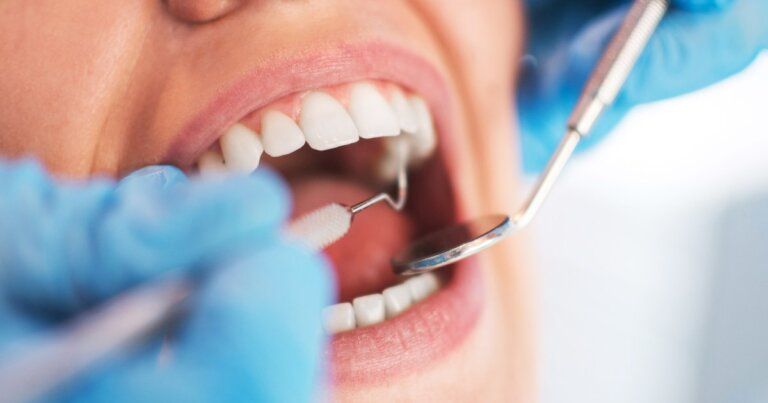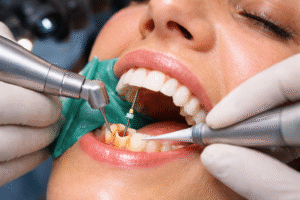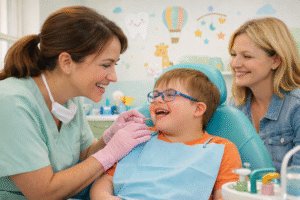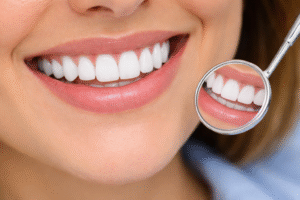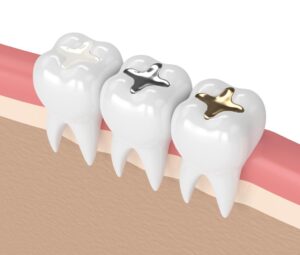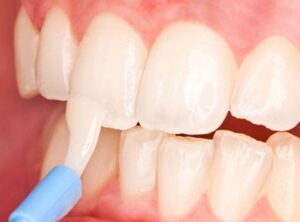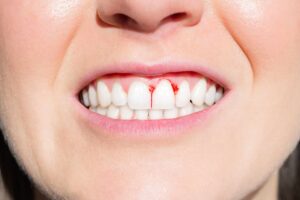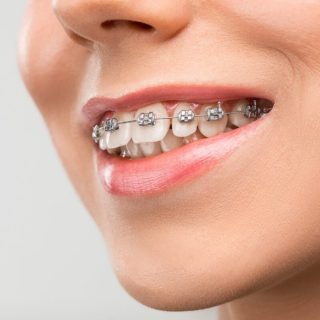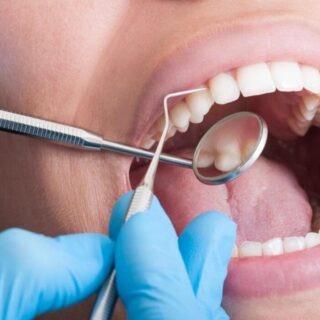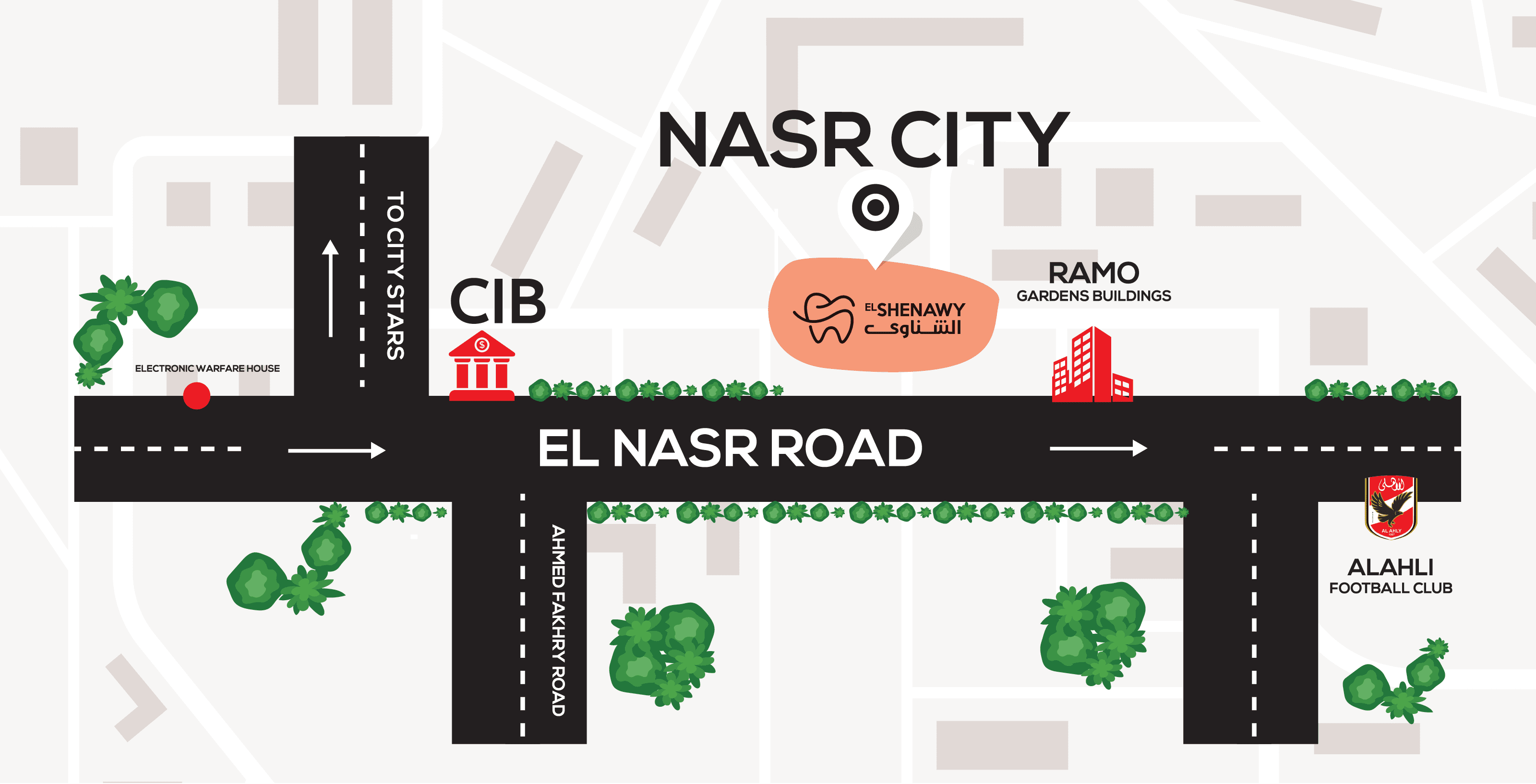We all know that pregnancy affects a woman’s overall health and one of the areas often impacted is her teeth, making dental care during pregnancy crucial. Hormonal shifts may lead to gum sensitivity, swelling, or bleeding, which can make brushing and flossing uncomfortable. Additionally, changes in eating habits; such as cravings or a condition called pica (the urge to eat non-food items like ice) can harm teeth and gums. These combined factors increase the risk of gum disease, cavities, and other dental issues.
In this blog, we’ll explore the most common dental challenges during pregnancy and how to manage them effectively.
Common dental issues during pregnancy
- Pregnancy Gingivitis: Hormonal changes, particularly elevated levels of progesterone and oestrogen, can trigger gum inflammation and sensitivity, resulting in bleeding, swelling, and tenderness.
- Periodontal Disease: This more severe gum infection, which damages the bone supporting the teeth, can develop from pregnancy gingivitis if left untreated.
- Pregnancy Tumours: Swollen, non-cancerous growths that can develop on the gums, usually during the second trimester.
- Tooth Decay: Cravings for sugary or high-carb snacks during pregnancy can increase the risk of cavities and enamel breakdown.
- Tooth Sensitivity: Acid reflux and morning sickness expose teeth to stomach acid, which can weaken enamel and make teeth more sensitive.
Toothache for pregnant women
Toothaches are actually quite common among pregnant women. Many pregnants experience toothache at some point, usually because their bodies are going through significant physical and hormonal shifts during pregnancy. These changes could affect their gums, tooth enamel, and could even change their eating patterns, all contributing to dental discomfort.
Common causes of toothache
- Hormonal Changes: Elevated estrogen and progesterone levels increase gum sensitivity and inflammation, causing pain or bleeding.
- Tooth Decay: Cravings for sugary or starchy snacks raise the risk of cavities — a common source of tooth pain.
- Morning Sickness: Constantly vomiting exposes your teeth to stomach acid, gradually wearing down the enamel and making them more sensitive.
- Gum Inflammation (Pregnancy Gingivitis): This common condition leads to swollen, tender gums that may feel like a toothache.
- Nutritional Deficiencies: Low intake of minerals like calcium can weaken teeth and cause discomfort.
If pregnancy has left your teeth feeling dull or stained, you might want to explore teeth whitening price at El-Shenawy Dental Clinics for a brighter post-pregnancy smile.
At-home remedies to alleviate toothache
- Salt Water Rinse: Gargling with warm salt water helps reduce inflammation and soothe irritated gums.
- Cold Compress: To relieve pain and minimise swelling, apply a cold pack to the outside of your cheek.
- Clove Oil: Known for its natural numbing effect, applying a small amount of clove oil to the affected area may temporarily reduce pain.
- Avoid Sugary Foods and Drinks: Limit sweets and sugary beverages, which can worsen tooth decay and sensitivity.
- Consult Your Dentist: If the pain doesn’t go away or seems to be getting worse, it’s important to make an appointment with your dentist. They can properly assess your case and discuss safe treatment choices with you.
Important note: Don’t take any medication without your doctor’s approval, some painkillers are not safe during pregnancy.
The connection between maternal dental health and baby’s health
A mother’s oral health plays a significant role in the overall health of her developing baby. Studies have found that problems like gum disease or untreated tooth infections can raise the chances of complications during pregnancy. Specifically, moms dealing with moderate to severe gum issues might have a higher likelihood of giving birth too early or having a baby with a low birth weight. This happens because the inflammation and harmful bacteria in the mouth can get into the bloodstream and potentially reach the uterus. That’s why maintaining good dental care during pregnancy is not only essential for the mother’s comfort but also for the baby’s healthy development.
Is dental work safe during pregnancy?
Yes! dental work is not only safe but recommended during pregnancy. Many people think that pregnant women should not go to the dentist, but it’s actually more important than ever to keep an eye on oral health during pregnancy. Some habits can develop decay, gum disease, or a myriad of other problems. If these problems aren’t addressed it could have a negative effect on both the mother and baby.
It’s perfectly safe to have your regular dental checkups at any point during pregnancy, and they’re actually important for avoiding complications. If you need urgent care, like getting a filling or treating an infection, that’s also considered saf. However, elective or cosmetic procedures (like teeth whitening) should ideally be postponed until after delivery.
In general, always inform your dentist and obstetrician that you’re pregnant before undergoing any procedure, so they can take appropriate precautions and ensure the care you receive is tailored to your condition.
Are dental x-rays safe for pregnant women?
Dental X-rays are safe to perform on pregnant women, especially for diagnostic or treatment purposes for urgent oral health problems. Today’s radiographic equipment uses very low levels of radiation, and modern techniques to minimize exposure and protect both the pregnant patient and their unborn child.
Even though dental X-rays are a standard part of regular dental check-ups, dentists generally try to avoid them with pregnant women, unless they really need to be done. However, if you’re dealing with a dental infection, pain, or swelling, getting an X-ray might actually be the safer choice than just letting the problem go untreated.
Treating dental issues safely during pregnancy
There are many dental treatments that are safe during pregnancy, specifically when they are required in order to care for your health and the health of your baby.
Safe options during pregnancy include:
- Medications: Some antibiotics and pain relievers are safe during pregnancy. Your dentist will choose medications that are fine to use during your pregnancy. But it is also important to inform your prenatal care provider first before you start taking any medication.
- Local Anesthesia: Local anesthesia, commonly used to numb your mouth during procedures like fillings or extractions, is safe for pregnant women when used in appropriate doses.
While urgent dental care can be done at any time, it’s best to schedule non-urgent or elective treatments (like cosmetic work) during the second trimester, or wait until after delivery.
4 common myths about dental care for pregnant women
- It’s okay to eat more sugar, the baby wants it: Excess sugar increases the risk of cavities and may be linked to allergies or asthma in babies. Alternatively, choose healthier snacks like fruits or nuts.
- Brush right after vomiting: Brushing immediately can damage enamel softened by stomach acid. The best thing to do is rinse with water, or baking soda and then wait an hour to brush.
- Every pregnancy results in tooth loss: Tooth loss should not be expected during pregnancy. Hormones may cause slight loosening of teeth, but tooth loss is usually a sign of a pre-existing problem.
- Gagging is a reason to stop brushing: If you don’t brush, you can actually increase plaque buildup and develop gum disease. You may try using a smaller toothbrush, a different toothpaste, or brushing at another time of day.
Top tips to maintain dental care during pregnancy
Good oral hygiene during pregnancy supports both your health and your baby’s development. Here are some essential tips to help you maintain strong teeth and healthy gums throughout your pregnancy:
- Brush and floss every day: Maintain the regular routine of brushing and flossing to get rid of plaque and stop gum disease.
- Handle morning sickness with care: If brushing after vomiting is hard, rinse with 1 tsp baking soda in 1 cup water. Wait at least an hour before brushing to protect enamel.
- Schedule regular dental checkups: Keep your dental visits every six months during pregnancy, and always inform your dentist you’re expecting.
- Eat a tooth-friendly diet: Focus on calcium, protein, and vitamins A, C, and D. Choose fruits, veggies, whole grains, lean meats, and low-fat dairy; avoid sugary snacks and drinks.
- Keep hydrated: To naturally rinse your mouth and lessen acid buildup, drink water frequently.
- Plan ahead if possible: Treat dental issues like cavities or gum disease before pregnancy to avoid complications later.
When to see a dentist while pregnant
Maintaining regular dental visits is an essential part of dental care during pregnancy. Notify your dentist as soon as you become pregnant so they can safely plan your treatment and prevent unnecessary X-rays.
Routine checkups and cleanings are safe during pregnancy but it is worthwhile to postpone any major procedures until after the first trimester when your baby’s vital organs are forming. However, if you experience any dental pain, swelling, or signs of infection, don’t wait.
If you missed a dental visit earlier in your pregnancy, aim to schedule a checkup during your third trimester to ensure everything is in good shape before delivery.
At El-Shenawy Dental Clinics, we are committed to supporting you with expert dental care tailored to every stage of your pregnancy. Our team understands the unique needs of expecting mothers and provides gentle, pregnancy-safe treatments to protect your oral health and support a healthier pregnancy. From routine checkups to safely managing discomfort, we’re here to ensure you feel safe, informed, and well cared for.
Book your pregnancy-safe dental checkup today!
Frequently asked question
- Is teeth whitening safe during pregnancy?
It’s generally best to avoid teeth whitening while you’re pregnant. Although there isn’t proof that it’s harmful, we don’t really know how the chemicals used in whitening might affect the baby. So, it’s safest to wait until after your pregnancy and breastfeeding.
- Which trimester is best for dental procedures?
The 2nd trimester (weeks 13 to 27) is the easiest and safest time for dental work.
- Can pregnant women have dental cleaning?
Yes, dental cleaning pregnancy is safe and recommended. It’s important for preventing gum disease and reducing the risk of oral infections during pregnancy.



